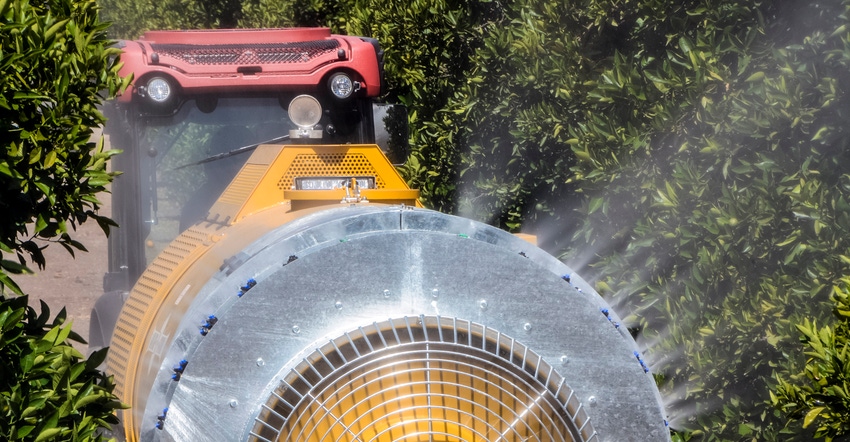
A state agency is clarifying a local alert that environmental groups are showing up uninvited to farms in California's Central Valley to disrupt chemical spray operations, which the state says is erroneous.
Growers were encouraged by their local agriculture agency to be vigilant during and after sprays after the Central California Environmental Justice Network circulated flyers seeking volunteers for what a state spokeswoman says is a University of California air monitoring study.
The project is funded by the California Air Resources Board's Community Air Grant Awards and implemented in partnership with UC Davis' Department of Public Health Sciences, CCEJN, Californians for Pesticide Reform and other groups, the state Department of Pesticide Regulation spokeswoman said.
The project is an expansion of the ongoing National Institute of Environmental Health Sciences-funded effort in which students collect air samples during the school day using wearable backpack-mounted air monitors, she said.
This wearable monitor is designed to capture actual lived exposure by residents, as an alternative to stationary monitoring. Wearing a backpack with a small pump and two air sampling tubes for three days, the monitoring team will turn on the sampler in the morning before leaving their house and wear the backpack for 12 to 14 hours.
No private property
However, the students aren't allowed to enter private property or fields without an invitation; they just wear the monitors as they go about their daily business, she said. The state is not aware of students going into unauthorized areas or of activists posing as study participants to gain access, she said.
A warning from the Tulare County, Calif., Department of Agriculture told growers about the flyers, voicing concern that volunteers would attempt to test for pesticide exposure without the proper training or protective gear.
Christopher Greer, assistant agricultural commissioner for Tulare County, said some county ag departments received requests from environmental groups for the pre-pesticide application notices required of pesticide applicators. He also said ag industry groups got wind of recruitment efforts to solicit volunteers to carry air monitoring equipment in and around farming operations.
"Once we put out the notice to growers the environmental groups were very unhappy with that," Greer said.
Commissioners routinely advise pesticide applicators and farmers to be vigilant about their surroundings while performing pesticide applications. Cars or people that should not be in or around these commercial operations should be questioned. Local law enforcement should be immediately informed in such cases.
Read the label
Greer said this should serve as a notice to growers and pesticide applicators to read and follow label directions, particularly those with specific reentry period prohibitions. Growers or pesticide applicators may want to add staff to spray operations to ensure that unauthorized people are not allowed in and around spray activities, and to document any potential issues for law enforcement, he said.
However, the study participants don't necessarily need to be on or next to a farm to continue their air-quality readings, the CDPR spokeswoman said. "They could be walking through the community," she said.
The study includes seven communities in three counties: Cantua Creek, Raisin City, and Caruthers in Fresno County; Arvin and Lamont in Kern County; and Cutler-Orosi and Lindsay in Tulare County.
[This story has been updated with new information and comments from the California Department of Pesticide Regulation.]
About the Author(s)
You May Also Like






